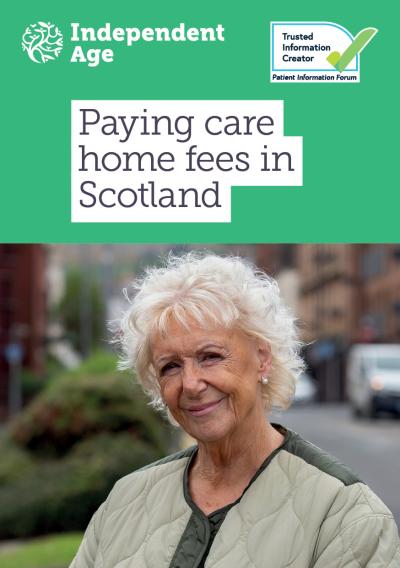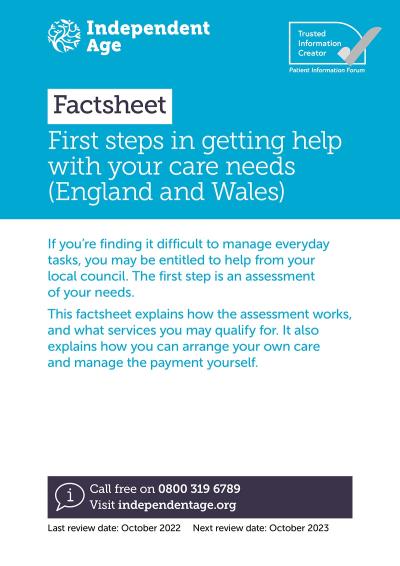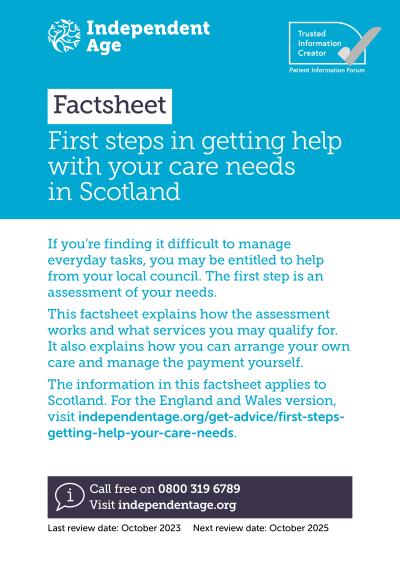Related publications

Paying care home fees in England and Wales

Paying care home fees in Scotland

First steps in getting help with your care needs in England and Wales

Residential care can be expensive, so it’s important to check you’re getting any help you’re entitled to. This usually starts with a care needs assessment by your local council, followed by a financial assessment.
The financial assessment (or means test) works out how much you’ll have to pay towards the cost of your care. It’s carried out by your local council. It is separate to the care needs assessment which looks at what your care needs are, such as a need for residential care.
The financial assessment will consider:
Only your income and capital is looked at, not your partner’s, if you have one.
It may include the value of your home if you own it, but this isn't always taken into consideration. This could be because your partner still lives there, for example. For more details, read our page Do I have to sell my home to pay for residential care?
If the council thinks you've given away your assets to avoid paying for care, they may still count them in the financial assessment. For more details, read Your assets and the financial assessment.
Nearly everyone will have to contribute something towards their care home fees. Even if you don’t need to make a contribution from any capital or savings you have, you will usually need to make a contribution from your income. Some amounts are ignored when calculating your income, for example:
You will be left with enough income to cover a Personal Expenses Allowance. The amount you must be left with varies depending on where you live.
Your local council can choose to increase your Personal Expenses Allowance if you are facing financial hardship, or having ongoing costs related to your property, for example. Call our Helpline if you would like advice about this.
| How the financial assessment works is different depending on where you live in the UK. |
If you live in England
In England, if you have capital:
If the local council is paying towards your care, you will usually have to contribute most of your income, apart from a small Personal Expenses Allowance. This is currently £28.25 a week in England (2023/24 rate).
If you live in Scotland
Although personal and nursing care is free in Scotland, you may need to pay for other costs, such as accommodation.
If you have capital:
If the local council is paying towards your care, you may have to contribute most of your income apart from your Personal Expenses Allowance. This is currently £32.65 a week in Scotland.
If you live in Wales
If you have capital over £50,000 (which could include the value of your home), you may have to pay all of your care home fees yourself.
If your capital is at or below this limit, the council will contribute towards your fees. How much you will pay and how much the council will pay towards your care will depend on your income. You will be left with at least the minimum income amount of £39.50 a week (2023/24 rate).
The value of your property is usually ignored for the first 12 weeks after you move into a care home, if:
This is to give you time to sell your property, or put other arrangements in place. See our page Do I have to sell my home to pay for residential care? for more information about your options.
After your financial assessment, your council will tell you if they’ll pay some of your care costs, and if so, how much. They should tell you the total amount they think your care should cost – including their contribution and yours. In England, this is known as your personal budget. It’s based on your eligible needs and factors like the cost of care in your area. It must be high enough to pay for what the council say you need.
The council must show that at least one care home in the area can provide the care you need at the rate that they would usually pay, and has a place available. If this is not the case, the council must increase the amount they say your care should cost. This may increase their contribution towards your care.
If there is a care home available at the rate the council would usually pay to meet your care needs but you’d prefer a more expensive care home, you may be able to move there instead if someone else will pay the difference – for example, a family member, friend or charity. This is a third-party top-up fee. You can't usually pay your own top-up fees, except in a few circumstances. In Scotland, you may be able to pay your own top-up fees if, for example, getting free personal care or nursing care payments has left you better off and you can afford to do so.
Read more on Care home top-up fees.
If you disagree with the outcome of your financial assessment, you might be able to challenge it. You could start by raising the matter informally with your council, or make a formal complaint using their complaints procedure. See our page Complaints about health and care services.
In Scotland, it’s unlikely that you would need to pay all of your own care home costs – if you have a care needs assessment from your council and they agree that you need personal care, this part of your care fees would be covered for you. The same applies if your needs assessment shows that you need nursing care. These payments would begin once you have had your assessment and there is a contract in place with a care home. So even if you’ll need to pay all your accommodation costs, it’s still worth involving the council in arranging your care.
In England and Wales, it's still a good idea to get a care needs assessment from your council even if you’ll be paying for your own care. The council must then give you a written assessment of your care needs, which can help you to decide what support or what type of care home will be best for you. They can also make sure you’re able to get financial information and advice to help you plan and pay for your care.
It’s useful to ask the council how much they’d normally pay for the amount and type of care you need. This can be helpful to know, for example, if you’re likely to qualify for council funding in the near future and don't want to be forced to move because your care home charges more than the council is willing to pay.
The council should also be able to help you find out about care homes in your area if you need this.
It can be helpful to get independent financial advice about how to pay for your care. Make sure you choose an adviser who has a specialist qualification in long-term care – a CF8 or CeLTCI qualification. There are various places you can search for an adviser, including the Society of Later Life Advisers and Unbiased. Advisers’ fees vary considerably, so ask up front how much it will cost.
Financial advisers can help you find financial products and services which might be suitable for you – there are a lot of these around and the quality varies considerably, so it’s worth getting advice. See our page Do I need to sell my property to pay for residential care? for more information.
In certain circumstances, the NHS may be responsible for paying for your care. If you have a high level of health and care needs, you may qualify for NHS Continuing Healthcare.
If you aren’t able to get this but it has been decided that you need nursing care in a nursing home, you'll qualify for NHS-funded nursing care. This would pay for the nursing you receive in a nursing home, but not the accommodation costs. If you’re paying for all your care, this would reduce the amount you have to pay. If the council is contributing towards the cost, this payment would likely reduce their contribution.
Find out more about NHS funding for care.
Care home fees are complicated, so we’ve partnered with Legal & General to provide a care costs calculator for people planning to move into a care home. This is to give you an idea of whether you might qualify for care funding from your local council, and how much care in your area may cost. You can call our free Helpline on 0800 319 6789 for more personalised advice.
Remember
To get any help from the council, regardless of your finances, you must first have a care needs assessment. The council will only help you if they assess you as needing to move into a care home.

Start by arranging a care needs assessment.
For more about the financial assessment, read our guide Paying care home fees in England and Wales or Paying care home fees in Scotland.